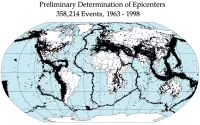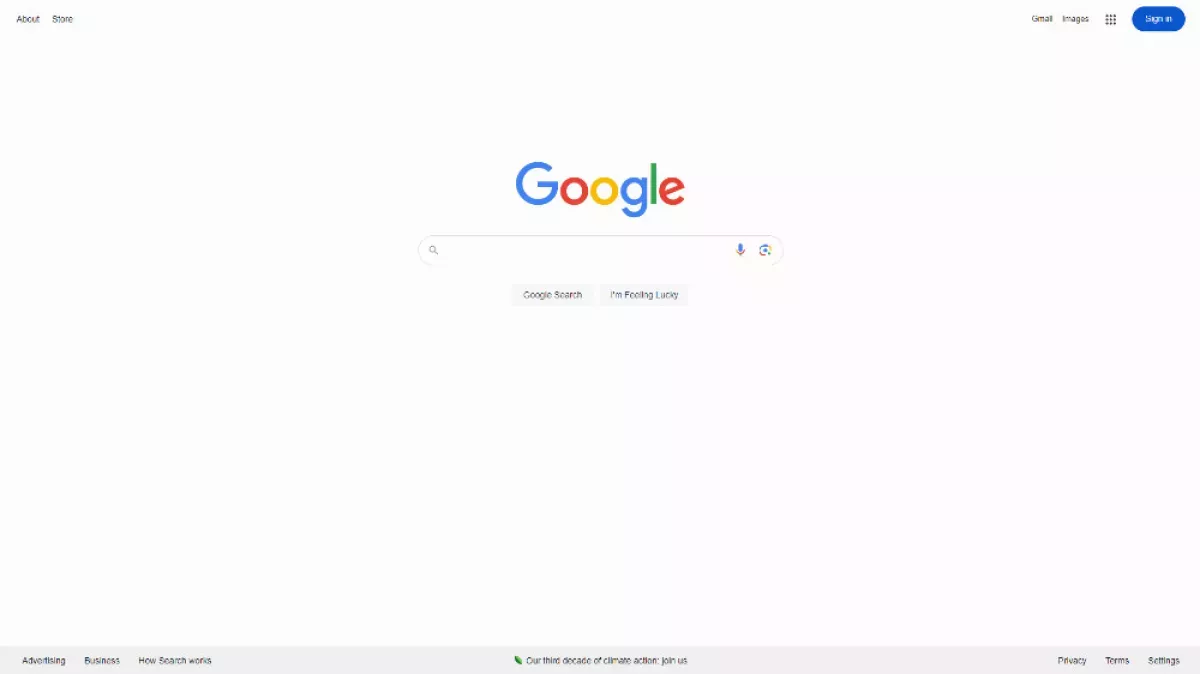Google Search is the dominant web search engine globally, developed and operated by Google. Users input keywords or phrases, and Google's algorithms analyze and rank websites to deliver relevant results. Its widespread use makes it the most popular search engine worldwide.
1996: Google Search Original Development
In 1996, Larry Page, Sergey Brin, and Scott Hassan originally developed Google Search. The search engine was set up in Susan Wojcicki's Menlo Park home garage.
1996: RankDex Page-Ranking Algorithm Developed in 1996
In 1996, Robin Li developed RankDex, a page-ranking and site-scoring algorithm, that influenced the development of PageRank.
1998: First Google Doodle
In 1998, Google created its first Doodle, a reference to the Burning Man Festival.
1998: Larry Page Files Patent for PageRank in 1998
In 1998, Larry Page filed a patent for PageRank, which includes a citation to Robin Li's earlier patent for RankDex.
2000: Robin Li Creates Baidu in 2000
In 2000, Robin Li, creator of RankDex, went on to create the Chinese search engine Baidu.
2003: Copyright Complaint by The New York Times
In 2003, The New York Times complained about Google's caching of content, claiming it infringed on their copyright. The United States District Court of Nevada ruled in favor of Google in both Field v. Google and Parker v. Google.
May 16, 2007: Google Launches "Universal Search" on May 16, 2007
On May 16, 2007, Google launched "Universal Search," which merged results from different kinds of search types (websites, news, pictures, maps, blogs, videos) into one.
2007: Estimated Revenue Loss from "I'm Feeling Lucky"
In 2007, Tom Chavez of Rapt estimated that Google lost $110 million in revenue per year due to users using the "I'm Feeling Lucky" button, which bypasses advertisements on the search results page.
2007: Reliance on Google Search
In 2007, researchers noted a tendency for users to rely exclusively on Google Search, potentially limiting their access to a broader range of information by overlooking other research tools.
2007: Eric Schmidt's 2007 Vision for Google Search
In a 2007 interview, Google's then-chief executive Eric Schmidt, stated a goal for Google users to be able to ask questions such as 'What shall I do tomorrow?' and 'What job shall I take?'
2008: Introduction of Autocomplete Search Suggestions
In 2008, Google started providing users with autocompleted search suggestions in a list below the search bar as they typed, initially showing the approximate result count for each suggestion.
January 31, 2009: Malware Classification Error
On January 31, 2009, for approximately 40 minutes, all Google search results were mistakenly classified as malware due to human error, preventing users from clicking them and displaying a warning message.
May 2009: Google Announces Parsing of Website Microformats in May 2009
In May 2009, Google announced that they would be parsing website microformats to populate search result pages with "Rich snippets".
August 2009: Google Invites Developers to Test "Caffeine" in August 2009
In August 2009, Google invited web developers to test a new search architecture, codenamed "Caffeine", and provide feedback.
2009: Energy Consumption per Search Query
In 2009, Google estimated that a search query requires approximately 1 kJ or 0.0003 kWh, which translates to 8 kg CO2 per second for Google's 40,000 searches per second, or over 252 million kilos of CO2 per year.
May 2010: Google Rolls Out SSL-Encrypted Web Search
In May 2010, Google rolled out SSL-encrypted web search, accessible at encrypted.google.com, to provide secure searching.
May 21, 2010: "Google Pac-Man" Doodle
On May 21, 2010, Google released the famous interactive "Google Pac-Man" Doodle.
June 8, 2010: Google Announces Completion of "Caffeine" on June 8, 2010
On June 8, 2010, Google announced the completion of "Caffeine", claiming 50% fresher results due to continuous updating of its index.
September 2010: Google Instant Search Announced
In September 2010, Google announced Instant Search, a feature that displayed suggested results as the user typed, aiming to save time. The technology was upgraded from HTML to AJAX.
November 2010: Instant Previews Introduced
In November 2010, Google introduced "Instant previews", a feature allowing users to preview screenshots of search results' web pages without opening them on the desktop website.
2010: Eric Schmidt Reaffirms Google's Future Direction in 2010
During a 2010 interview, Eric Schmidt reaffirmed the goal for Google search to tell people what they should be doing next rather than just answering questions.
2010: Google Instant Impact on "I'm Feeling Lucky"
In 2010, with the introduction of Google Instant, the "I'm Feeling Lucky" button initially disappeared, requiring users to opt-out of Instant results to use the button's original functionality of directly accessing the first search result.
January 2011: Geolocation Links Added to Real-Time Search
In January 2011, geolocation links of posts were made available alongside results in Real-Time Search.
June 2011: Google Homepage Redesign
In late June 2011, Google introduced a new look to the Google homepage, with the goal of increasing the adoption and use of Google+ social tools.
July 2, 2011: Google Real-Time Search Goes Offline
On July 2, 2011, Google Real-Time Search went offline after the deal with Twitter expired.
July 2011: Real-Time Search Becomes Inaccessible
In July 2011, Real-Time Search became inaccessible due to the expiry of a commercial arrangement with Twitter to provide access to tweets.
2011: Filter Bubbles
In 2011, Eli Pariser suggested Google Search query results are tailored to users, isolating them in filter bubbles, raising concerns about personalized information ecosystems.
2011: Introduction of Google Voice Search in 2011
In 2011, Google introduced "Google Voice Search", allowing users to search by speaking rather than typing their queries.
May 2012: Knowledge Graph Added to Google Search in May 2012
In May 2012, Knowledge Graph boxes were added to Google's search engine, starting in the United States. Knowledge Graph is a knowledge base used by Google to enhance its search engine's results.
2012: Google Handled More Than 3.5 Billion Searches Per Day in 2012
In 2012, Google Search handled more than 3.5 billion searches per day.
2012: Google Changed Search Indexing Tools in 2012
In 2012, Google changed its search indexing tools to demote sites that had been accused of piracy.
2012: "I'm Feeling Lucky" Redesign
In 2012, Google changed the "I'm Feeling Lucky" button to serve as an advertisement for Google services; hovering over the button made it spin and show an emotion, linking to a related Google service when clicked.
2012: Search Indexing and Query Volume in 2012
In 2012, Google had indexed over 30 trillion web pages and was receiving 100 billion queries per month, also caching a significant amount of indexed content.
2012: Google Introduces Knowledge Graph in 2012
In 2012, Google introduced Knowledge Graph, a semantic search feature designed to enhance search results.
2012: FTC Fine for Privacy Violation
In 2012, the US Federal Trade Commission fined Google US$22.5 million for violating their agreement not to violate the privacy of users of Apple's Safari web browser. The FTC was also investigating whether Google's favoring of its own services in search results violated antitrust regulations.
2012: Encrypted Connections Introduced Globally
Since 2012, Google Inc. has globally introduced encrypted connections for most of its clients to bypass governmental blockings of its commercial and IT services.
April 2013: Instant Previews Removed
In April 2013, Google removed the "Instant previews" feature, which allowed previewing screenshots of search results' web pages, due to low usage.
May 2013: Google Search Translation Feature Removed
In May 2013, Google Search discontinued its feature to translate search queries into other languages due to low usage.
May 2013: Audio-Based Search Announced
In May 2013, at Google I/O, Google announced that users on Google Chrome and ChromeOS would be able to initiate an audio-based search by saying "OK Google", which allows follow up questions. A Chrome update with voice search functionality rolled out a week later, requiring a button press.
September 26, 2013: Google Announces "Hummingbird" Algorithm Update on September 26, 2013
On September 26, 2013, Google announced the "Hummingbird" algorithm update. The update placed greater emphasis on natural language queries, considering context and meaning over individual keywords. The algorithm had already been in use for a month prior to the announcement.
November 2013: Yellow Labels for Advertisements
In November 2013, Google began testing yellow labels for advertisements in search results to improve user experience by differentiating between organic and sponsored content.
2013: European Commission Found Google Search Favored Its Own Products in 2013
In 2013, the European Commission found that Google Search favored Google's own products, instead of the best results for consumers' needs.
May 2014: "OK Google" Added to Chrome Browser
In May 2014, Google officially added "OK Google" voice activation into the Chrome browser, enabling voice search without button presses.
February 2015: Google Announces Mobile Search Algorithm Change in February 2015
In February 2015, Google announced a major change to its mobile search algorithm which would favor mobile-friendly websites over others.
October 2015: "OK Google" Removed from Chrome
In October 2015, Google removed the "OK Google" voice activation from the Chrome browser, citing low usage, though the microphone icon for activation remained.
2015: Experimentation with Previewed Text Snippet Length in 2015
In 2015, Google experimented with the length of the previewed text snippet in its search results.
April 2016: Google Search App Update with Trends
In April 2016, Google updated its Search app on Android to feature "Trends", which showed search queries gaining popularity. This update received backlash, and the company later added an opt-out option.
May 2016: Google Expands on Rich Snippets with Rich Cards in May 2016
In May 2016, Google expanded on the "Rich snippets" format to offer "Rich cards", displaying more information about results in a swipeable carousel-like format at the top of mobile websites.
May 2016: Voice Search Usage on Mobile Devices
In May 2016, Google reported that 20% of search queries on mobile devices were conducted through voice.
May 2016: Knowledge Graph Answers Roughly One-Third of Monthly Google Searches in May 2016
In May 2016, Google reported that the Knowledge Graph was able to answer "roughly one-third" of the 100 billion monthly searches it processed.
October 2016: Google Announces Mobile-First Indexing in October 2016
In October 2016, Google announced that the search engine would be making a separate, primary web index dedicated for mobile devices, with a secondary index for desktop use.
December 15, 2016: New Desktop Search Interface
On December 15, 2016, Google launched a new desktop search interface that mimics their modular mobile user interface to create a previously unseen level of design consistency for Google results. The design highlights search features in boxes.
December 2016: Android Feed Preview
In December 2016, Android devices were introduced to a preview of the Google Search mobile app feed, perceived as related to Google Now.
2016: Google Search Relies on Deep Neural Networks in 2016
As of mid-2016, Google's search engine began to rely on deep neural networks to improve search result relevance and accuracy.
2016: Biased Search Results
In 2016, Google search results for terms like "three Black teenagers" produced images of criminal mugshots, while searches for "three White teenagers" showed smiling, happy teenagers. This reflected human prejudice embedded in the algorithms.
2016: Filter Bubbles and the U.S. Presidential Election
In 2016, filter bubbles, along with fake news and echo chambers, were mentioned as contributing factors to the surprising results of the U.S. presidential election, suggesting that platforms like Facebook and Google create personalized online realities.
June 2017: Google Expands Search Results to Cover Job Listings in June 2017
In June 2017, Google expanded its search results to include available job listings from various major job boards and company homepages.
July 2017: Google Discover Received Major Update in July 2017
Google Discover received a major update in July 2017.
July 2017: Official Release of Google Discover on Mobile
In July 2017, Google officially launched Google Discover on both Android and iOS as a feature of the Google Search mobile app.
July 26, 2017: Google Removes Instant Results
On July 26, 2017, Google removed Instant results from search due to the growing use of mobile devices, where search interaction and screen sizes differ significantly from computers.
September 2017: Trends Feature on iOS
In September 2017, the Google Search app on iOS was updated to include the "Trends" feature, mirroring the functionality previously introduced on Android.
December 2017: Google Rolls Out Mobile-First Indexing in December 2017
In December 2017, Google began rolling out its mobile-first indexing change, after having already done so for multiple websites.
2017: Experimentation with Previewed Text Snippet Length in 2017
In 2017, Google experimented with the length of the previewed text snippet in its search results.
2017: Rich Cards Expand Globally in 2017
In 2017, the "Rich cards" feature expanded to all countries globally.
April 30, 2018: Encrypted Google Search Discontinued
On April 30, 2018, Google discontinued the encrypted.google.com address, as all Google products and most new browsers used HTTPS connections by default.
August 2018: Google Announces Broad Core Algorithm Update in August 2018
In August 2018, Google announced a broad core algorithm update, nicknamed "Medic", which targeted medical and health-related websites that were not user friendly and did not provide a good user experience.
September 2018: Google Feed Renamed to Google Discover in September 2018
In September 2018, Google Feed was renamed to Google Discover, and its design and features were updated.
2019: Child Sexual Abuse Images on Google Search
A 2019 New York Times article revealed the presence of images of child sexual abuse on Google Search and the company's reluctance at times to remove them.
2019: Google Bans Political Campaign Ad Targeting in 2019
As of 2019, Google announced that it would not allow political campaigns worldwide to target their advertisements to people to make them vote.
2020: Google Search's Market Share in 2020
In 2020, Google Search held a 92% share of the global search engine market, solidifying its position as the most-visited website worldwide. Approximately 26.75% of Google's monthly global traffic came from the United States.
2020: Start of United States v. Google LLC Antitrust Case in 2020
In 2020, the United States v. Google LLC antitrust case began. Internal Google documents from this case led to the claims in 2023 that Google Search was "bloated and overmonetized."
2023: Google Unveils Search Generative Experience in 2023
At the 2023 Google I/O event in May, Google unveiled Search Generative Experience (SGE), an experimental feature in Google Search that produces AI-generated summaries in response to search prompts.
2023: Concerns about Google Search's Monetization in 2023
In 2023, based on internal Google documents, technology reporters claimed that Google Search was "bloated and overmonetized," suggesting that advertising profits were prioritized over search quality.
March 2024: Google Announces Algorithm and Spam Targeting Update in March 2024
In March 2024, Google announced a significant update to its core search algorithm and spam targeting, which is expected to eliminate 40 percent of all spam results.
May 2024: AI Overviews rollout and criticism
In May 2024, Google rolled out AI Overviews in the United States, which quickly faced criticism for providing inaccurate and bizarre suggestions. Google addressed these issues with technical changes, scaling back the feature and pausing it for some health-related queries. The system has also received criticism from Scientific American for using 30 times more energy than conventional search and potentially reducing traffic to news websites.
October 28, 2024: AI Overviews Expanded to 100 More Countries
On October 28, 2024, Google further expanded AI Overviews to 100 additional countries, including Australia and New Zealand.
2024: Search Generative Experience Renamed to AI Overviews in 2024
At I/O in 2024, the Search Generative Experience feature was upgraded and renamed AI Overviews.
March 2025: Introduction of AI Mode in Search
In March 2025, Google introduced an experimental "AI Mode" within its Search platform, leveraging the Gemini 2.0 model to provide comprehensive, AI-generated responses to complex queries with multimodal inputs.
Mentioned in this timeline
Facebook is a social media and networking service created in...

Google LLC is a multinational technology company specializing in online...

Baidu Inc is a prominent Chinese multinational technology company focused...

Larry Page is an American entrepreneur and computer scientist who...
India officially the Republic of India is a South Asian...

An apple is a widely cultivated round edible fruit originating...
Trending

17 minutes ago Shakira Announces Free Concert in Mexico City's Zócalo for Her Fans

3 hours ago Roman Reigns Pulled From Show, Wins Royal Rumble 2026; Future WWE Plans

2 hours ago Mike Goldberg details Brock Lesnar's transformative impact and influence on the UFC.

2 hours ago 7.1-Magnitude Earthquake Strikes Sabah, Malaysia, Shaking the South China Sea Region

4 hours ago Brook Lopez's Double-Double, Zubac Trade Impact, and Clippers Notes Highlighted.
4 hours ago House of the Dragon Season 3: Total War and Targaryen Battle Teased.
Popular

Jesse Jackson is an American civil rights activist politician and...

Barack Obama the th U S President - was the...

Bernie Sanders is a prominent American politician currently serving as...

Michael Joseph Jackson the King of Pop was a highly...
The Winter Olympic Games a major international multi-sport event held...

XXXTentacion born Jahseh Dwayne Ricardo Onfroy was a controversial yet...
